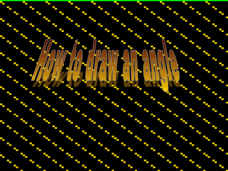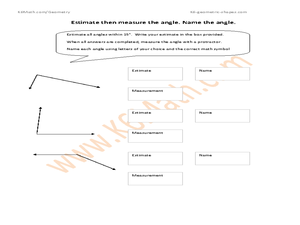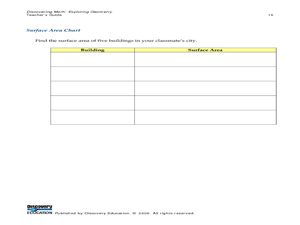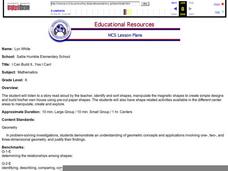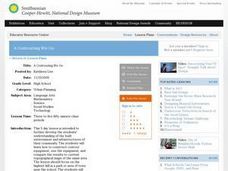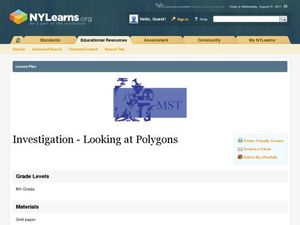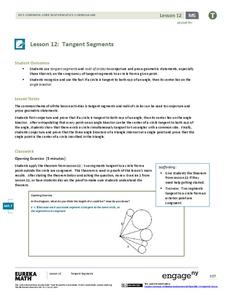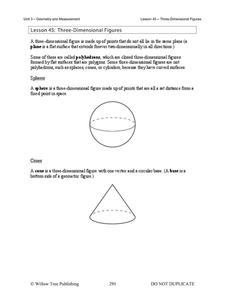Curated OER
Shape Recognition
Students explore geometry by analyzing different shapes. In this shape identification lesson, students discuss the characteristics that make certain shapes unique and the same characteristics that cause shapes to look the same. Students...
Curated OER
Classifying and Measuring Angles
For this classifying and measuring angles worksheet, 5th graders use a protractor to measure 9 angles and write what kind of angle it is.
Raytheon
Just Measure It
In this line segments and angles instructional activity, students solve problem solving problems and multiple choice questions about line segments and angles. Students complete 7 pages of problems.
Curated OER
How to Draw an Angle
How do you draw an angle? Dispel the confusion with this step-by-step teaching tool. Seven steps to angle drawing are shown in a simple format. While these steps are easy to follow, no explanation of how this process works is...
Curated OER
Classifying Angles
In this classifying angles activity, 7th graders identify and complete 17 different angles illustrated on the sheet. First, they use the key given to outline each angle. Then, students use a protractor to measure each angle and determine...
Curated OER
Angles by BBC Teachers
Fourth and fifth graders write the measurement of the missing angle in six problems include three triangles, a semi-circle, and two circles. They use a protractor and the given angle measurements to draw six angles.
Curated OER
Parallel and Perpendicular Lines
Learners study parallel and perpendicular lines. For this parallel and perpendicular lesson, pupils explore 2-D shapes and determine if the sides are parallel or perpendicular.
Curated OER
Estimate then Measure the Angle #4
In this angles activity, students estimate angles to within 15 degrees, then measure and name each. A reference web site is given for additional activities.
Curated OER
Poly-Mania
This hands-on activity takes young geometers on a tour of 2D polygons and 3D polyhedrons. After exploring different web resources and discussing geometric shapes, small groups construct models of polyhedrons using bendable straws. Note:...
Discovery Education
Discovering Math: Exploring Geometry
Apply geometric properties and formulae for surface area and volume by constructing a three-dimensional model of a city. Learners use similar and congruent figures and transformations to create a city of at least 10 buildings. They trade...
EngageNY
Complex Numbers and Transformations
Your learners combine their knowledge of real and imaginary numbers and matrices in an activity containing thirty lessons, two assessments (mid-module and end module), and their corresponding rubrics. Centered on complex numbers and...
Curated OER
Sphere Dressing
Geometric design makes a fashion statement! Challenge learners to design a hat to fit a Styrofoam model. Specifications are clear and pupils use concepts related to three-dimensional objects including volume of irregular shapes and...
Curated OER
Put Your Truss in Building Bridges
Students apply abstract concepts, such as stress, fulcrums, the law of gravity, and the strength of different geometric shapes. Groups of student contractors operate simulated architectural firms to create strong, economical bridges.
Curated OER
Identifying, Mapping, and Personifying Countries Involved in WWII
Get artsy with this WWII group activity, starting with a whole-class assignment. Create a map of Europe, Northern Africa, and the Pacific using geometric shapes cut from construction paper and placed on the floor. Consider splitting the...
Curated OER
I Can Build It.....Yes I Can!
Kindergartners listen to a story read by their teacher, then use magnetic shape pieces to construct simple designes. They "build" their own house using pre-cut paper shapes. This age-appropriate lesson would be an excellent choice for...
Curated OER
The Math in the Design and Building of Bridges
Research various types of bridge designs. Your class will be asked to consider what it would be like without bridges while learning about how they work. They will construct a model bridge based on given parameters. They then calculate...
Curated OER
Get in Shape with Geometry
Using geoboards, computer programs, and hands-on manipulative materials, elementary schoolers engage in a study of two and three-dimensional geometric shapes. This lesson is chock full of good teaching ideas on the subject, and the...
Curated OER
A Contouring We Go
Students examine the built environment and infrastructures of their community by constructing contour equipment, using the equipment, and comparing their results to current topographical maps of the same area
Curated OER
Inquiry Unit: Modeling Maximums and Minimums
Young mathematicians explore the maximun area for patio with the added complexity of finding the mimimum cost for construction. First, they maximize the area of a yard given a limited amount of fence and plot width v. area on a...
Curated OER
Gumdrop Crystal Models
A great way to learn about molecular structures is to make a model. Gumdrops and toothpicks are used to construct crystal models. The models are based on theories of crystal shapes that occur because of positive and or negatively charged...
Curated OER
8th Grade Math Parallel and Transversal Lines
Eighth graders label and define geometrical lines and angles. They identify angles on the board as acute, obtuse, straight, or right. In groups, 8th graders build with masking tape on the wall a pair of parallel lines, and a transverse...
NY Learns
Investigation - Looking at Polygons
Middle schoolers construct polygons by plotting points on a coordinate plane. Pupils connect the points and identify which polygons they have drawn. They will need graph paper to carry out the assigned activities. A vocabulary list,...
EngageNY
Tangent Segments
What's so special about tangents? Learners first explore how if a circle is tangent to both rays of an angle, then its center is on the angle bisector. They then complete a set of exercises designed to explore further properties and...
Willow Tree
Three-Dimensional Figures
Time to move into the third dimension! Learn the names of the geometric solids and count faces, edges, and vertices. Then learn to recognize nets that create a given solid.



